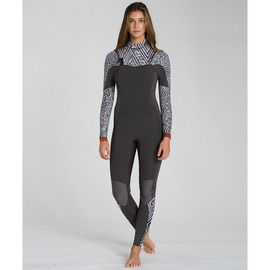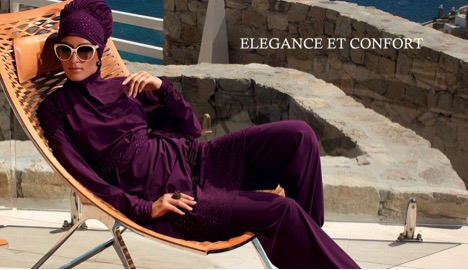Swimwear is often a contentious issue with women around the world and with summer upon us in the northern hemisphere, this year is no exception. From body consciousness to practicality, what swimwear you buy for the summer season can often be a difficult decision. But at least what to buy and wear remains your choice. Well, for some. This season may be even harder for women who choose to wear Muslim or so-called modest swimwear in Europe. As The Express has reported, Austria has now banned burkinis in a swimming pool, and the precedent of niqab bans suggest there may be more such measures taken in other countries.
Modest swimwear isn’t just the choice of Islamic women who want to cover. Surfers have long worn rash vests and leggings, marketed by cool surf brands such as Billabong & O’Neill. Many who are concerned about skin damage and sun exposure wear long-sleeved, long-legged swimwear made from the same fabric as burkinis with most having an inbuilt sun protection factor of fifty plus. All this leads me to ask: are men and children banned from covering up in surf wear or is it just women? And if the issue with the burkini is not the covered skin, is it just the extended swim cap that covers the hair that is causing offence because this identifies the women as Muslim? Describing the ban as a ‘health issue’ is a disguise at what this really is; Islamophobia. There is no reason a burkini, made from the same materials as surf swimwear, poses a health risk. Instead, the ban further isolates Muslim women in Europe and beyond for being made to feel that their dress sense is not compatible with society.
I myself made the shift from a two piece to an all in one burkini. It is my choice to try and cover whilst poolside so I can feel comfortable and make the most out of my love for swimming, and my faith, as well as being involved in family activities and with our visitors who in the summer heat spend most of their time in the pool.
My burkini has received mixed opinions; from my teenage sisters looking shocked to nods of approval for those who want to wear more modest clothes around the pool. Mostly from those running after young children and being forced into flume rides, slides and other embarrassing activities that kids make you take part in. Recently, I have been enjoying these activities without the swimsuit mishaps that often occur when in smaller pieces.
If you fight for women’s rights for equality to wear what they want, then it has to work both ways. Those outside of the Muslim community have often joined in the debate about whether or not burkinis should be banned without asking for opinions of women who wear them. Articles such as those in The Telegraph commented on how a woman wearing a burkini looks like a ‘pregnant elephant seal’ further reinforcing the idea that women are supposed to look a certain way. The article itself is full of assumptions and incorrect misconceptions that I could write an entire separate post on, but for now I will leave it at this: a woman should be able to choose how much skin to reveal and how much to cover in public places as she deems fit, whether that is for religious purposes or not.
Recently, a campaign over ‘Are You Beach Body Ready’ in Britain invited an angry backlash. The ads were discussed as objectifying women. I agree. Women are too often judged for their bodies, and the campaign furthered the idea that you have to look a certain way to go to the beach. Although the debate about the “beach body” campaign was about body consciousness, the discussion over whether or not the campaign was appropriate is relevant to the banning of burkini swimwear. Revealing and covering are both associated with how society thinks women should look and how women are judged. Neither should have anything to do with anyone else, except the woman’s choice of what she feels comfortable to wear.
I am based in Dubai, so this hasn’t been an issue for me as modest swimwear and swimsuits usually coexist quite happily side by side over here. But I have to wonder, when did it become acceptable to force women to wear something they might see as akin to underwear or if they refuse to do so, be legally excluded from a public swimming bath? Accepting these kind of bans just reinforces racism and isolation from society.
It is about time that Islamophobia is taken for what it is. In this instance, it is being used to further limit woman’s rights and to make women feel pressured into revealing more skin in order to ‘fit in’ with society. There are arguments that so-called modesty wear reinforces an oppressive rhetoric, but I believe this comes from those who haven’t ever made the decision to wear something that isn’t readily available and accepted from mainstream society. Denying women who want to wear what they believe to be modest clothes that choice clearly does nothing for the argument about oppression, it just adds a different form of oppression.
Integration into society should not be about what women wear. Women are constantly attacked, criticised and judged on their bodies and clothing. If you truly want to fight for women’s rights to wear what they want and not to be treated as objects, then this has to work both ways. Whether we are talking about how much to reveal or cover, this should remain a women’s choice.




1 Comment
Not sure about the name Burkini,..it is condemned from the start…, swimming suits come in different shapes forms styles ..
Surfing suite, is not called BurkinI suites